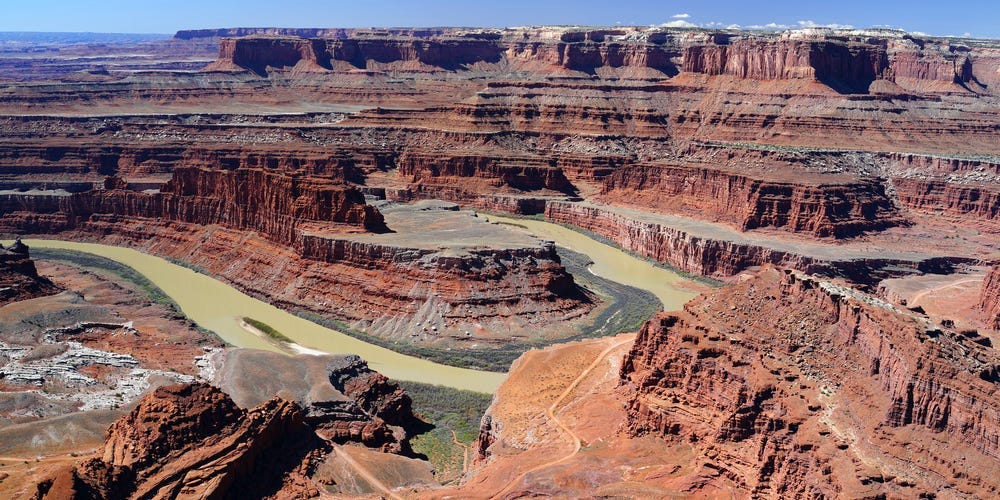New York’s Letchworth State Park is a combination of the Grand Canyon and Niagara Falls.
Known as the “Grand Canyon of the East,” Letchworth State Park lives up to the hype. In a way, it’s like the Grand Canyon meets Niagara Falls, as the park’s enormous gorge is dotted with a series of impressive waterfalls.
The 7-mile Gorge Trail runs along much of the gorge’s rim and has plenty of scenic overlooks and opportunities to hike down (or up) to the falls. There are also several bathrooms, snack bars, and restaurants along the way.
If you prefer a more isolated and facility-free trek, head to the lesser-visited Finger Lakes Trail. During a recent 15-mile hike along it, I only ran into one person.
Watkins Glen is another great state park in New York.
Watkins Glen State Park is about an hour-and-20-minute drive from Letchworth, so it’s easy to get both in on the same trip. In fact, both parks are often featured on lists of the best state parks in the country.
Watkins Glen is much smaller and has fewer hiking trails than Letchworth, but it packs a pretty punch of beauty along its short, main trails.
The two-mile main trail follows the glen’s stream, which generates 19 waterfalls as it dives down 400 feet. The path winds over and under waterfalls through refreshing sprays of water.
Because you can start and finish the walk at various places, you can walk a distinct route each way.
Like the national parks, Watkins Glen State Park has a ton of options for tent camping and RVs.
But since you’re only 10 minutes from the city of Watkins Glen, you could easily go the hotel and restaurant route instead.
Montana’s Makoshika State Park has stunning badland formations.
Montana’s largest state park, Makoshika State Park, is also the most unusual.
Come for the out-of-this-world badland formations and stay for the fossilized remains of prehistoric creatures such as the Triceratops and Tyrannosaurus Rex.
Makoshika comes from the Lakota phrase meaning “bad land” or “bad earth,” and here, mudstone and sandstone badlands stretch across over 11,500 acres.
Mushroom- and Mars-like formations shoot up from the land like orange, gray, and rust-colored stone tents in a fossilized fairy forest.
The delightfully distinctive landscape also makes it a pristine place for photography lovers.
Table Rock State Park in South Carolina has challenging hikes and stunning views.
South Carolina is loaded with photo-worthy locations, but the most photographed natural wonder in the state is the exquisite Table Rock State Park.
Nestled along the edge of the Blue Ridge Mountains, this underrated state park is basically a huge chunk of metamorphic rock that geology nerds and happy hikers can both get excited about.
The challenging seven-mile Table Rock Trail hike requires visitors to climb more than 2,000 feet in elevation, but the epic views at the top are well worth it.
Though the hiking is incredible, my favorite feature might be the adorable accommodations inside the park. Think rustic wood cabins with fireplaces, flannel bedspreads, porches with rocking chairs, and full kitchens, so you don’t need to leave the park if you don’t want to.
If hiking isn’t your thing, you can also explore the park by kayak, raft, and even hot-air balloon.
Kachemak Bay was Alaska’s first state park.
Many visitors travel to Alaska for some of the most spectacular and secluded national parks in the country, but its state parks are equally as epic.
Kachemak Bay State Park was declared Alaska’s first state park in 1972, and its 400,000 acres of mountains, forests, beaches, glaciers, and ocean are home to an astounding number of wildlife species.
Sea otters, seals, porpoises, and even whales make frequent appearances along the bay, as do eagles and the ever-popular puffins.
Inland dwellers include moose, mountain goats, coyotes, wolves, and black bears, which you might be lucky enough to spot while hiking or skiing.
The park’s remoteness helps preserve its ecological diversity and wilderness status, and its limited access points mean the park receives fewer visitors than other parks on the list.
Since there are no roads into the park, you’ll need to fly or water taxi in from Homer, Alaska. If you plan to head into the backcountry, be prepared and bring a satellite device.
Tettegouche State Park is one of the many parks along Minnesota’s North Shore.
Considering Minnesota’s North Shore is packed with state parks, it’s hard to pick just one. When pressed, I’m going with Tettegouche State Park, about an hour north of the consistently underrated city of Duluth.
Hiking along the waterfront trails of Tettegouche reminded me of the jagged cliffs of Acadia National Park in Maine (but with far fewer tourists).
Lake Superior is so vast — and can get so whipped up on a windy day — that it really feels like the Atlantic Ocean. The crashing waves provide even more ambiance to the already astonishing scenery.
The park also has a range of trails, from the short-and-sweet waterfront walk to Shovel Point with 300 steps to climb (but plenty of scenic overlooks to stop at) to the over 300-mile Superior Hiking Trail.
Baxter State Park in Maine rivals Acadia National Park.
Not to throw shade on Acadia, which truly is a stunning national park, but Baxter State Park is basically its lesser-known and lesser-visited cousin.
Like Acadia, Baxter has amazing hiking, but it can also claim both Maine’s highest peak, Mount Katahdin, and the terminus of the Appalachian Trail.
Head out on the northernmost end of the Appalachian Trail or tackle the Knife’s Edge Trail, where you hike along the peak’s ridge and feel like you’re at the top of the world.
If hiking isn’t your thing, you have 200,000 acres of parkland to wander around at your own pace, taking in tranquil lakes and gushing waterfalls while watching for hawks, eagles, and even black bears.
Because the park’s main priority is preserving wilderness, it lacks paved roads, running water, and electricity, so you can really enjoy an off-the-grid experience.
South Dakota’s Custer State Park is a great place to see buffalo.
In my opinion, Custer State Park is the most beautiful park in South Dakota. This stunning 71,000-acre park is a wildlife wonderland in the middle of the rolling Black Hills.
My family spent several days exploring the park, and while the hiking was great, the highlight of our weeklong trip was the buffalo jeep safari tour.
Hundreds of buffalo wandered the hills, lazily sauntering in front of and around the open-air vehicle. Many of them were only a few inches from us.
If you’re really into buffalo, plan your trip for late September, when the park holds its annual buffalo roundup.
Nāpali Coast State Wilderness Park in Hawaii is a remote wonderland.
Hawaii has some of the most stunning scenery in the country, so it’s no surprise that its state parks are also jaw-droppingly beautiful.
Nāpali Coast State Wilderness Park takes its name from the pali, or cliffs, that rise thousands of feet above the Pacific Ocean and create deep and narrow valleys punctuated with waterfalls.
Like many of the most remote and well-preserved wilderness areas, the park is not accessed by bridge or road. Rather, you need to either hike the coast or take a boat in.
Once you’re in the park, you’ll have more than 6,000 acres of remote beaches, lush valleys, and forested cliffs to explore by foot, kayak, or snorkel.
Dead Horse Point State Park in Utah looks like the Grand Canyon.
If you’re looking for spectacular scenery and dreamy desert views without the crowds of nearby Arches National Park, head to the lesser-known Dead Horse Point State Park.
Its desert canyons and woodlands very closely resemble the Grand Canyon, and the immensity of this park is the sort of thing you need to see to believe.
Hike along red-rock trails and down into deep canyons, bike the thrilling single-track Intrepid Trail System, or simply just look up for some world-class stargazing.
Dead Horse Canyon is an official International Dark Sky Park. On a clear night, you can see thousands of sparkling stars illuminating the desert landscape.
This story was originally published on November 9, 2023, and most recently updated on August 13, 2024.
Read the full article here
















